Capacitating Small Scale Farmers of Benguet
The Department of Agriculture together with Agri- Business and Marketing Assistance Division (AMAD) and (JAEC) Japan Agricultural Exchange Coun cil and Benguet Agri-Pinoy Trading Center (BAPTC) conducted a two day fo rum to the farmer’s cooperatives and organizations of Benguet. The activity was held at Margarita Hall, Supreme Hotel, Baguio City on May 28-29, 2019.
The forum was opened by Marlyn Cosalan the Expert Agriculturist of the DA-CAR. She introduced the objective of the ac tivity which is to capacitate small scale vegetable and fruit farmers association through barangay/municipal food terminal.
On one hand, Octavio Ablos the Institu tional Development and Extension Service Unit Officer of BAPTC introduced the par ticipants from the different farmers’ organ izations and cooperatives of Benguet to gether with the representatives of the Rice Terraces Farmers’ Cooperative of Ifugao.
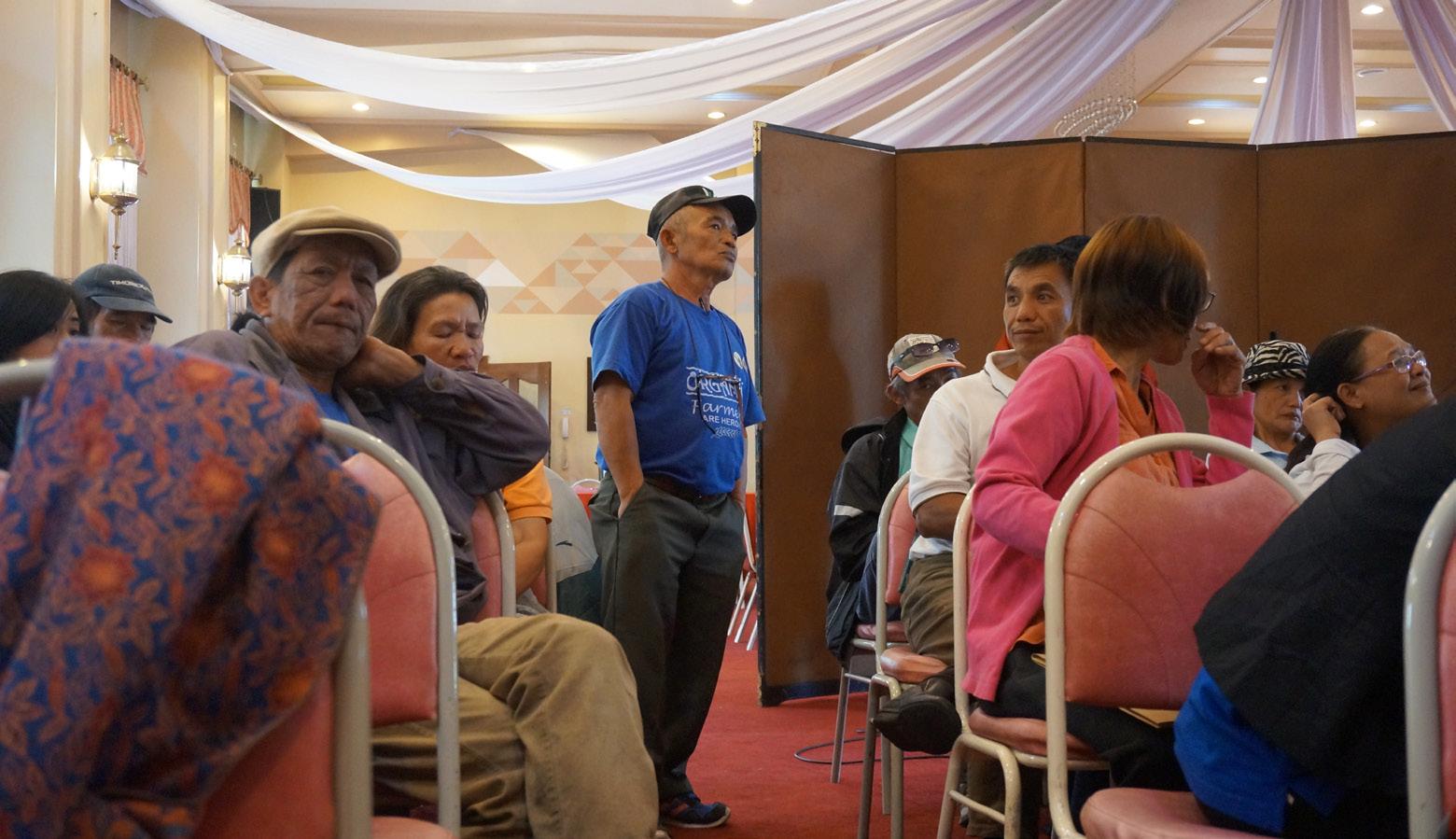
The groups Introduced are the Madaymen Good Agricultural Practitioners Association
of Kibungan (MGAPA), Lengaoan Indige nous Farmers’ Multi-Purpose Cooperative of Buguias (LIFMPC), La Organica of La Trin idad, Rice Terraces Farmers’ Cooperative of Ifugao, Bileng-Belis Farmers’ Multi-Purpose Cooperative of Kapangan, Topdac Multi-Pur pose Cooperative (TMPC) of Atok, repre sentatives from the food terminal of Bashoy and Lusod in Kabayan, Tambule Farmers’ Association of Balakbak, Sunnywood buyers from Mandaluyong City, Macascasa Farmers’ Association of Buguias and representatives from the Itogon Municipal Food Terminal.
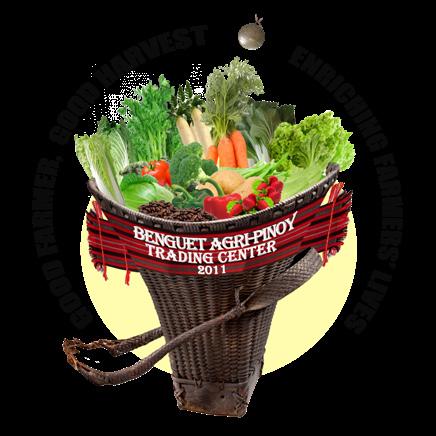

KAYABANG
THE OFFICIAL NEWSLETTER OF BENGUET AGRI-PINOY TRADING CENTER
WHAT’S INSIDE
CONTINUED at Page 6 BAPTC Seeks Legal Assistance from BSU ACPC: PLEA Program for Farmers and Fisherfolks Panagyaman: Introducing the Benguet Highland Vegetables Festival Modern Trading Center for Highland Farmers and Traders BAPTC Accreditation Loosen Up for Now The Making of Farm-Preneurs
The Benguet Agri-Pinoy Trading Center (BAPTC) was established through the earlier initiative of the Benguet Stste University (BSU), offering its research, ex tension and instruction expertise and the prime lot portion of the strawberry fields for thr establishment of modern postharvest facility to further develop the vegetable and root crop industry by enhancing linkages , transforming the vegetable market, and building markets on correct prin ciples.
The concept involved six (6) stakeholders (DA, BSU, Province of Bengue, Benguet Congressional District, LGU- La Trinidad, and Federation of Farmers’ Organization) for various important rules to enhance the highland agricultural systems and serve as Advisory Board. It was supported by Board od Regents (BOR) Resolution No. 1941, s. 2010 and BOR Resolution No. 2359, s. 2015.
The BAPTC establishment was funded by the Department of Agriculture and is under the national Agri-Pinoy Trading Center (APTC) program through Special Order No. 369. It primarily caters the farmers, traders, processors, wholesalers, retailers and consumers. Its services are open to any entity engaged in vegetable trading. It serves as an alternative marketing outlet to which vegetable farmers can directly sell their produce at rationalized prices, thereby ensuring reasonable returns to the farmer-producers. Aside from trading semi-temperate crops, it is to openfor intertrading with other APTCs.
Modernizing farmer’s access to global market



Building avenues for farmers and consumers to have better market access through participatory capability building and provision of innovative technologies and quality facilities
VISION MISSION GOAL

BAPTC as a Center of Excellence in trading, marketing and socio-economic enterprise for semi-temperate crops.
OBJECTIVES

A multi-stakeholder approach to sustainable linkage of farmers to market.
The BAPTC is established to increase the farmers’ incomes and protect them from the effects of market price fluctuations.
CORE VALUES

BENGUET AGRI-PINOY TRADING CENTER CONTACT US or visit:
Integrity Honesty Transparency Commitment Cooperation
+639087810397 (074) 423-3031 BSU Strawberry Fields, La Trinidad, Benguet BAPTC Price BAPTC PMO www.benguetaptc.com benguetaptc@yahoo.com baptc2015@gmail.com “Good Farmer, Good Harvest, Enriching Farmers Lives” NEWSLETTER SUPERVISOR EDITORIAL BOARD WRITERS EDITOR-IN-CHIEF LAY-OUT ARTIST LUIS P. ULILA ADOLFO E. LABLABONG GLYREL B. PALBERAS ADOLFO E. LABLABONG KIMBERLY LOBEDA GLYREL B. PALBERAS ANGELICA S. SAMBO
BAPTC seeks legal assistance from BSU

On March 8, 2019 the Project Steer ing Board (PSB) approved the request of Benguet Agri-Pinoy Trading Center (BAPTC) to the Board of Regents (BOR) of Benguet State University (BSU) and to the Office of Legal Affairs to represent BAPTC on legal matters during the BAPTC-PSB 2019 First Quarterly Meeting held at the Third floor, Commercial Building, BAPTC.
The Legal Affairs Office of BSU through At torney Allan Sacpa, Attorney II of BSU Legal Affairs required the BAPTC to make two res olutions on legal assistance and be further be checked and assessed by the Board of Regents of BSU as the governing board of the universi ty and to the Project Steering Board of BAPTC . The two resolutions approved by the PSB are Resolution No. 02, series of 2019 entitled, Resolution requesting the Board of Regents of BSU to authorize its office of BSU Legal Af fairs and Resolution No. 03, s. 2019 entitled, Resolution authorizing the BSU legal affairs.
The approval of the boards to the two resolutions from the BAPTC will allow and authorize the Legal Affairs Office of the University to render service to the trad ing center and represent them if prob lems and cases will be filed to the court. Octavia Ablos the Institutional Development and Extension Service (IDES) Unit Officer of BAPTC said that the BAPTC request
ed legal assistance mainly because BAPTC has no legal personality. Also, remembering that BAPTC is a donated property by the BSU from the Department of Agriculture (DA) in 2015, based on the Deed of Dona tion between BSU and DA, BAPTC is a so cio-economic enterprise of BSU and thus needs further review of legal documents to determine the ownership of the center. The said legal assistance aims to take legal actions on the issue in collecting rents of
He said that demand letters can be issued to the lessees who can’t pay for their rents. Giv ing of time allowance is possible in encourag ing the lessees to pay. If demand letters and deadlines for the lessees to pay for their rents will not be successful then filing a complaint to the court can be another remedy. With the power of the court to decide, the lessees can be fined or be vacated in their stalls or within the premises of the trading center. Octavio Ablos is hoping that with the le gal assistance they will be able to collect rents for now which is also a great help for the center to meet the target income for the year 2019. She also stated that through legal assistance, BAPTC will be able to have fund management and that the center can sue or be sued. This is their current disadvantage of not suing the lessees not paying their rents because of the lack of legal personality.
lessees. The Finance Division of the trading center reported incidents of late payments from some lessees and presented information on three lessees who did not pay their rents since the opening of the trading center. With some issues raised by the BAPTC and antic ipated complaints from the lessees, Attorney Allan Sacpa gave few information on the ac tions that can be done by the trading center.
“Once the ownership of BAPTC is soon determined, the owner will continue legal assistance on legal matters,” added Ablos. For the meantime, Attorney Sacpa said that their office is rendering legal advices for BAPTC especially on the said issue on un paid rents. But also suggested that BAPTC can hire other lawyers to be funded by the partner, the Department of Agriculture.
//KIMBERLY LOBEDA_BSU-INTERN

KAYABANG 3THE OFFICIAL NEWSLETTER OF BENGUET AGRI-PINOY TRADING CENTER
“We focus on what we have and protct on hat we have.” -Assec. Ariel Cayanan
Modern Trading Center for Highland Farmers and Traders
The Benguet Agri-Pinoy Trading Center (BAPTC) established through the initiative of Benguet State Univer sity (BSU) offers modern post-har vest facility to the farmers, traders, processors, wholesalers, retailers and consumers. It helps in the devel opment of vegetable and root crop industry by enhancing linkages, trans forming the vegetable market, and building markets on correct principles.
Support facilities, amenities and ser vices are designed and provided for clients and customers in improving their market access and transactions.

The Benguet Agri-Pinoy Trading Center (BAPTC) has three spot trading build ings labelled as STB one (1), two (2) and three (3). These are designated for vegetable packing and farmers, whole sale facilitators and trader’s negotiation.

Food courts and function halls are also lo cated at the spot trading buildings. Two food courts with 200 m2 each in area are located at the second floor of spot trading buildings two (2) and three (3) while the function or conference hall with 200 m2 measurement is at spot trading building one (1).The cozy food courts offer affordable and delicious meals that farmers and traders can try while the spacious function hall at spot trading building one (1) is for meetings/ conferences.
If tired from work and wants to sleep over in the center, the guestel is just a few meters away from the Spot Trading Build ings. The guestel at the second floor of the commercial building with 18 rooms is open to farmers, visitors and tourists who wander around the valley of La Trinidad.
The rooms on the second floor can ac commodate 40 people while the open space on the third floor of the guestel is conducive for coffee and as function hall. The fee for a one night stay in the guestel is 350 pesos.
Moreover, the BAPTC has 12 cold stor
age rooms and 10 dry storage rooms that can be utilized by farmers. Farmers and traders can store their vegetables and oth er products in these storage rooms that prolong the shelf lives of their produce. Each room has an area of 50m2. A cold stor age room can hold 28 tons of produce while a dry storage room can accommodate 32 tons of commodities. A 250 peso fee will be collected in every square meter usage of the facility.
Furthermore, the parking spaces at BAPTC can accommodate 300 to 400 vehicles such as truckers, farmer’s vehicles, and private cars at once. A one kilometer by-pass road in BAPTC serves as an additional parking space. The parking rate ranges from 100 to 250 pesos depending on the vehicle type and duration of stay in the trading center.
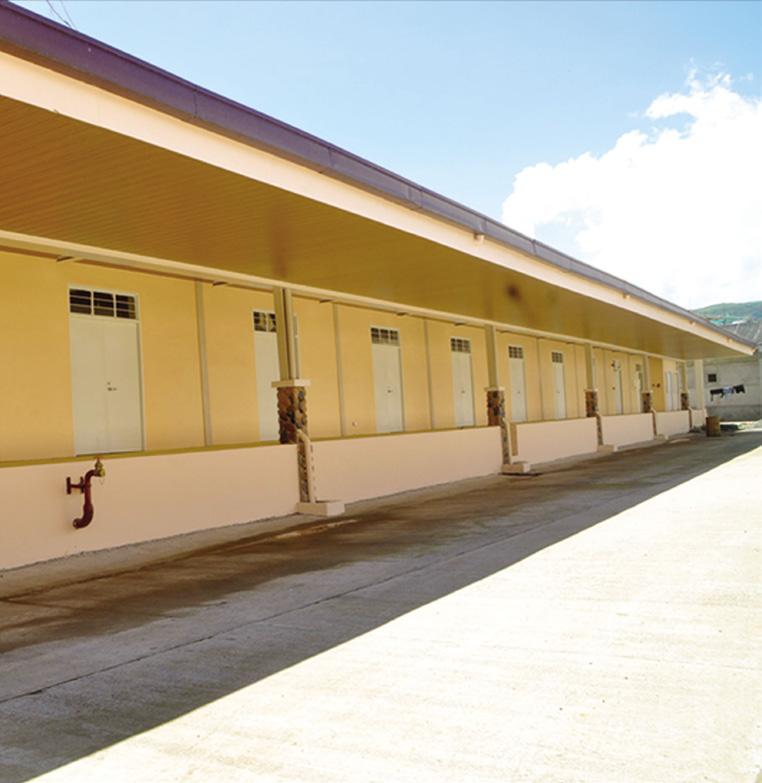

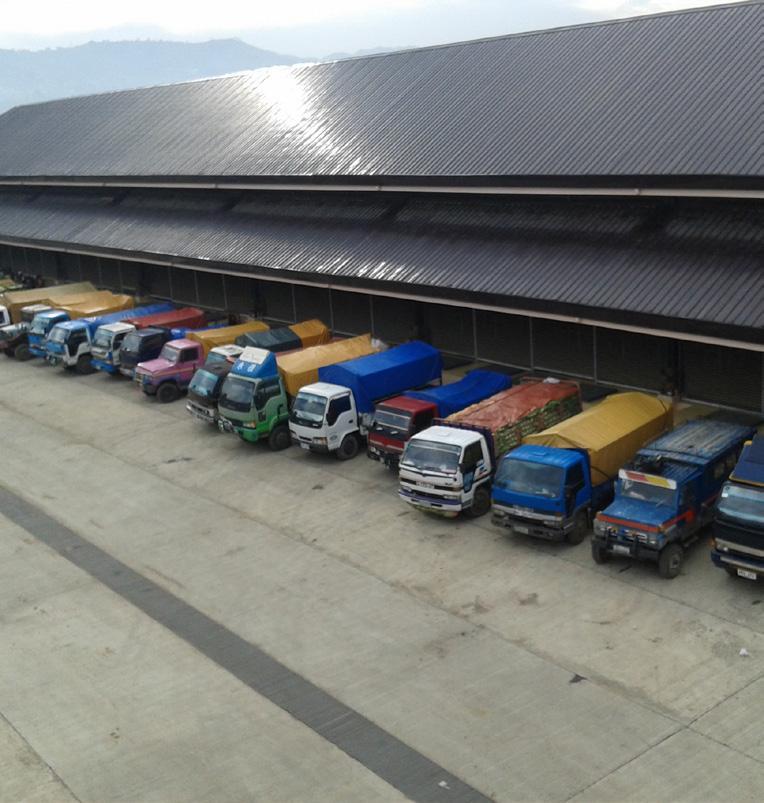
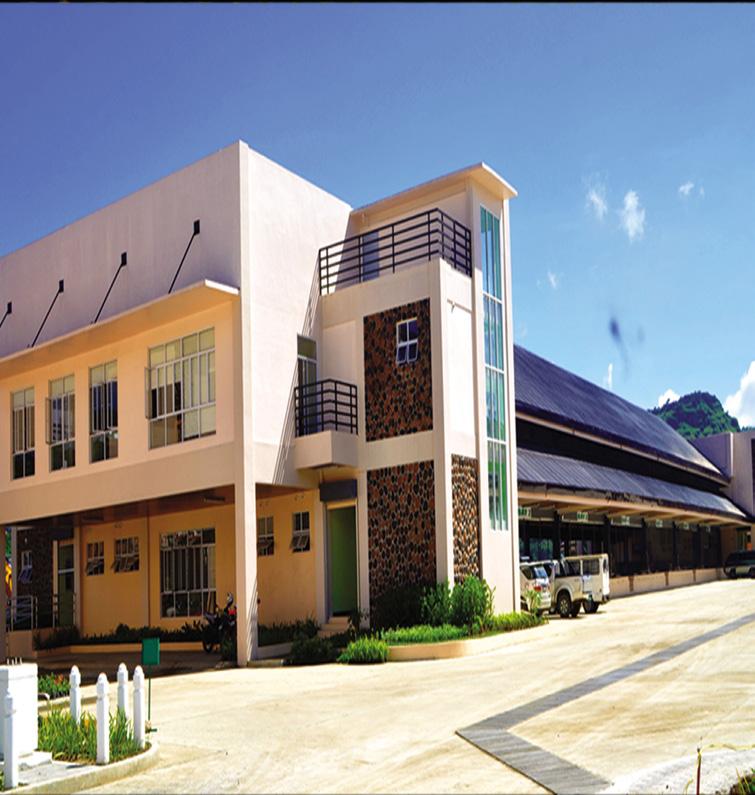
To ensure the safety of the people work ing in the center, the area is secured with 24/7 security guards and equipped with CCTVs.
These facilities and amenities can be used and enjoyed by farmers, traders, proces sors, wholesalers, retailers and consumers. They can be of help in the better market access of farmers and consumers while generating livelihood opportunities for farmers, empow ering farmers for strong bargaining positions and establishing a world-class food terminal.
Gina Cabading, Hilda Tanas and some other wholesalers said that BAPTC has given them clean and spacious environment. The place is suitable for their daily work. The fee for the space rent is not too high nor too low for them, thus, making them feel happy. On one side, the interviewees said that the low number of customers in the trading center can have an impact to their financial profit. The enhancement of the highland agricul tural systems in the trading center is be ing maintained by the six (6) stakeholders (DA, BSU, Province of Benguet, Benguet Congressional District, LGU-La Trini dad, and Federation of Farmers’ Organ ization) acting as the Advisory Board.
// ADOLPHE LABLABONG_BSU-DDC-INTERN
KAYABANG4
THE OFFICIAL NEWSLETTER OF BENGUET AGRI-PINOY TRADING CENTER
ACPC:
PLEA Program for Farmers and Fisher Folks
In 1986, Agricultural Credit Policy Coun cil (ACPC) was created to assist the Depart ment of Agriculture (DA) in synchronizing all credit policies and programs. The ACPC also helps the government develop and imple ment strategies and policies that increase and sustain the flow of credit to agriculture and fisheries and support agriculture moderni zation, food security and alleviate poverty.
The ACPC became an attached agen cy of the DA in 1987 through Executive Or der 116 that was mandated to administer the Comprehensive Agricultural Loan Fund. The DA extended their loans to the 10 poorest provinces in the country that include, Apa yao, Easter Samar, Western Samar, North ern Samar, Negros Oriental, Zamboanga del Norte, Lanao Del Norte, Cotabato, Sarangani and Maguindanao. Afterwards, Benguet and Mountain Province were included on the list.
In 2017, Production Loan Easy Access (PLEA) started in Benguet. This program was designed by the Department of Agriculture (DA) Secretary and Agricultural Credit Pol icy Council (ACPC) headed by Emmanuel F. Pinol. It aims to address the financial needs of marginal and small farmers and fisherfolk
for a fast, convenient and affordable credit.
The PLEA program offers a non-col lateral loans for agri fishery production through cooperative banks, cooperatives, farmers and fisherfolks organization and non-government organizations (NGO’s) as credit delivery conduits in extending loans to marginal and small farmers and fisherfolks.
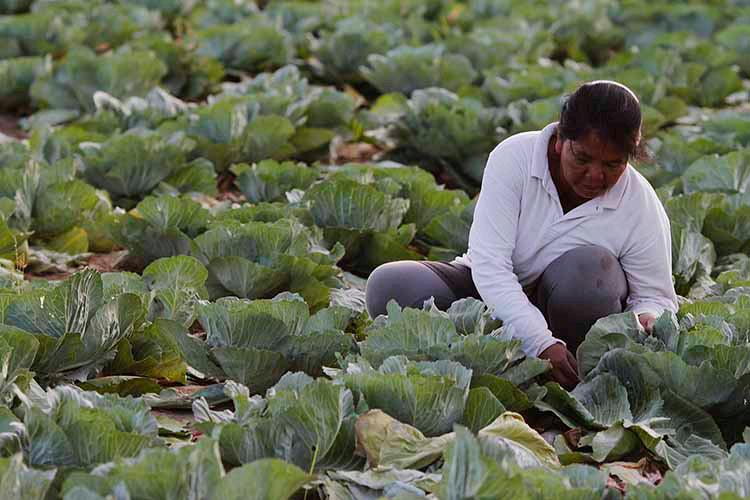
The ACPC taps lending conduits in ex tending loans to marginal and small farmers and fisherfolks. The lending conduits must have a lending system and should be cur rently accredited or have been qualified un der any existing partnership under ACPC lending programs and/or any of the follow ing institution programs such as Landbanks, PCFC, AGFP, Cooperatives, Farmers organ ization and Non-government organization.
Those who want to avail of the program must be engaged in production of crops, poultry, and/or livestock, aquaculture or fishing activ ity and are classified as indigent. As per the government, poverty threshold must be regis tered or enrolled in the registry system for basic sectors in agriculture (RSBSA), and must pass the credit/background investigation of the lending conduits and have good credit stand
ing. These lending conduits select, evaluate and approve and collect loans from borrow ers under agreed guidelines with the ACPC.
In Benguet, only 5 municipalities (Ben guet, Buguias, Atok, Kabayan, La Trinidad and Bokod) availed to this program. These mu nicipalities have existing conduits that help in the process of lending and borrowing money.
For Apayao, Kalinga and Mountain Province, approval of the program is still on process.
According to Kristle Ann S. Balingan, the PDO III-PMO eligible farmers/fish er folk borrowers can avail up to 50,000 to 150,000 depending on the agri-fish ery production project to be financed.
The head of the house or the spouse or adult working member can avail of the loan with the interest rate of 6% per year.

Furthermore, farmers and fisherfolk can also borrow money under the Surviv al Recovery Assistance Program (SURE).
The program is given to agricultural house holds who are affected by calamities. The loan and emergency assistance package pro vide relief to the borrowers or beneficiaries.
//ANGELICA S. SAMBO_BSU-DDC_INTERN
KAYABANG 5THE OFFICIAL NEWSLETTER OF BENGUET AGRI-PINOY TRADING CENTER
Capacitating ...... from page 1

Different topics were discussed in the two day forum. On the first day, Jimmy Lingayo the Manager and Farmer of Rice Terrac es Farmers’ Cooperative of Banaue, Ifugao shared his knowledge on the rice production and cost production of heirloom rice. Heir loom Rice is a native product of the Cor dilleras. It is mainly found in the provinces of Ifugao, Mountain Province, Apayao, Kalinga and some other provinces of Cordillera.
Speakers from BAPTC discussed the BAPTC concepts, accreditation processes, issues and concerns on the BAPTC opera tion and management and review plans and other concerns with the farmers and traders.
Good Agricultural Practices (GAP) from the Department of Agricultural was also discussed during the forum where in con cerns regarding the use of pesticides and good practices in crop production are raised.
The JAEC group headed by MR. Koji Kane da shared his knowledge on the Safe Vegeta ble Production and Marketing Technology Improvement Project in the Philippines. He compared the good practices of the Japanese farmers to the Filipino farmers in preserving the freshness of the vegetables in the market.
Moreover, groups from the Central Agri-business and Marketing Assistance Di vision (AMAD) who are based in Manila were invited to the forum. They shared their activ ities and market strategy to the participants. One market concept shared is the TienDA, the “farmer’s market” concept version of the Department of Agriculture where farm ers and fishers are given chance to sell their products directly to the consumers/buyers.
According to Marilou Saltico, a member of the Farm Forces of the Philippines and an organic farming group, the activity is a great avenue to learn about marketing products.
On the other hand, the event is education al, in a sense that the participants learn new techniques, in a sense that they found anoth er venue for market and also the event chal lenged the farmers and the farmers’ associa tions to produce quality products according to Olivia Carantes a representative from the Ba rangay or Municipal Food Terminals Group.
Jocelyn Reyes, the representative of Joy ful Garden Organic Association and from the buyers group stated that the program is a good opportunity for the buyers to help the producers sell their goods. The event is also a great way for farmers to raise their concerns and address their needs.
S. SAMBO_BSU-DDC-INTERN
BAPTC Accreditation Loosen Up For Now
The Benguet Agri-Pinoy Trading Center (BAPTC) grants recognition and permit to individual, associations or cooperatives to use the BAPTC facilities and amenities. They accredit stakeholders to participate in the trading system managed by the Trad ing Operations Division (TOD) of BAPTC.
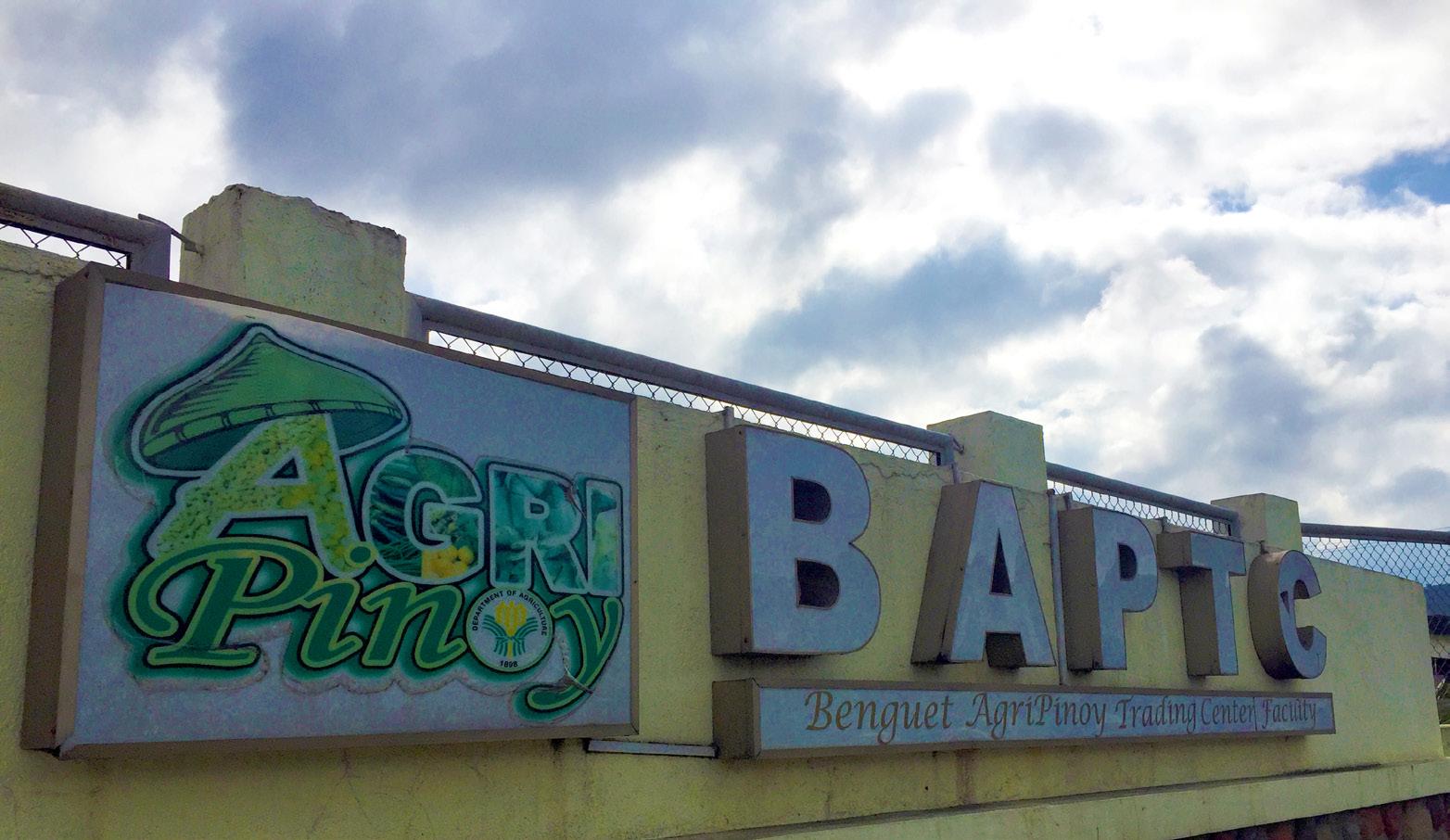
Once accredited, the stakeholders can avail BAPTC trainings, participate in the consolidation and/or contract growing pro gram offered by BAPTC, have linkage to In stitutional buyers and other markets and be included in the BAPTC Incentive Programs.
As of the moment, the accreditation de partment loosens up their accreditation pro cess to further collect information from the farmers and encourage them to be accredited.
Mildred Licangan, the Accreditation Officer of the Project Management Office (PMO) of BAPTC said that they use profiling in gather ing the personal data of the stakeholders. This is an easier way of recording the transactions of farmers and buyers in the trading center.
Profiling means that the accreditation officer will just get the personal information of the in dividual without asking him or her to submit the requirements needed for the accredita tion. This method will attract the clients to be easily a member of the trading center without giving him or her burden or headache in pro cessing and submitting required documents.
Meanwhile, it was reported that there were only sixty-three new individual ac credited clients and no new group appli cants for accreditation in February 2019. Mildred Licangan agreed that this may be due to the limited number of farmer groups and buyer groups. There are 140 farmer groups, 22 buyer/seller groups, eight groups of inter-trader, four transport groups and four packers and porter groups in their re cord. She added that these are the groups formed for now and were already accredited.
With this, the office decided to not strictly implement accreditation process so that they may be able to record more farmers who come to trade in the center.
One limitation that affected the accreditation for the stakeholders is the few numbers of vegetable transactions in the trading center.
The Trading Operations Division re corded 721 farmers, 126 out of 513 mar ket facilitators, eight farmer groups, and 62 buyer stakeholders who have transactions in the month of February.
Mildred Licangan stated that the previous months may not be the harvest time for farmers so few expected farmers will transact and visit the trading operations division for profiling.
In order to encourage more farm ers, traders and individuals to be ac credited in the trading center, she suggested the office to produce more Infor mation Education Campaign (IEC) materials.
On one hand, Octavia Ablos the Insti tutional Development and Extension Ser vices (IDES) Unit officer said that the IEC production will soon resume since the Inter nal Operating Budget (IOB) of 2019 was ap proved already by the Project Steering Board.
The contents of the IEC materials to be pro duced will include the vision, mission, goals and objectives of BAPTC, its services, accred itation processes, programs and accomplish ments. The IEC materials will showcase the programs of BAPTC to all its stakeholders.
Aside from conducting IEC’s at different ba rangays, the IDES Unit also facilitates trainings for capability building of accredited members.
These activities and actions being done by the office of BAPTC will attract and encourage farmers, traders, packers and other stakehold ers to be accredited and be part of the day to day transactions that happen in the trading center.
//KIMBERLY LOBEDA_BSU-DDC-INTERN
KAYABANG6 THE OFFICIAL NEWSLETTER OF BENGUET AGRI-PINOY TRADING CENTER
//ANGELICA
ACCREDITATION SYSTEM
What is BAPTC ACCREDITATION?
BAPTC accreditation is an act of granting rcognition and permit to individuals and groups to utilize the BAPTC facilities and participate in trading systrm unde certain terms and condi tions. Once accreditted, it is a non-transferrable privelege granted by BAPTC.
Privileges of being Accreditted
*Transact or be involved in the trading system being managed by the Trading Operation Division (TOD)
*Participation in the consolidation and/or contract growing programs under the Contract Trading thru the Contract Growing and Consolidation Unit
*Avail of BAPTC Free trainings and seminarworkshops (i.e. GAP, Food Safety)
* Linkage to institutional buyers and other markets
* Inclusion in BAPTC incentive programs
How to Get Accreditted?
Secureand Fill-up Accreditation Form
Attach Necessary Requirements

Submit the Accreditaion Form and Attachments to the Trading Operations Unit
Accreditation Officer will review the submitted documents.
Proceed to the Information and Communication Technology Unit for ID Processing
Present ID to the Accreditor for releasing
REQUIREMENTS:
BUYER
1.Individual Trader/ Buyer
a.Photocopy of Business Permit
b.Photocopy of Audited Financial Statement for the past 2 years
c.Photocopy of Government Issued IDs (2 copies) d.2 pieces 2x2 ID picture e.NBI or Police Clearance
f.Accomplished Accreditation Form(s)
2.Association/ Cooperative/ Federation
a.Photocopy of Business Permit
b.Photocopy of BIR Registration, if applicable
c.Photocopy of Audited Financial Statement for the past 2 years
d.Photocopy of Updated CDA/ SEC/ DOLE Registration
e.List of Officers including photocopy of their IDs
f.Master List of Members

g.Board Resolution stating three (3) official representatives h.2 pieces 2x2 ID picture
FARMER
1.Individual Farmer


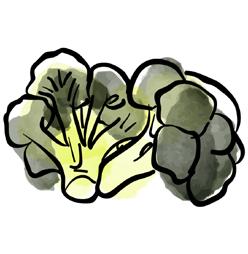
a.Baranggay Certification for Residency and occupation as farmer

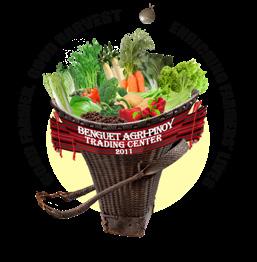
b.Accomplished Farmer’s Profile Form c.2 pieces 2x2 ID picture
2.Farmer’s Group
a.Baranggay Certification of Good Standing
b.Photocopy of BIR Registration,if any c.Photocopy of Audited Financial Statement for the past 2 years
d.Photocopy of updated CDA/SEC/ DOLE Registration
e.List of Officers f.Master List of Members g.Three (3) group representatives h.Photocopy of Government issued IDs (2 copies) per member
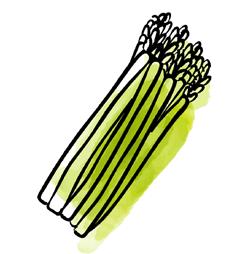
MARKET FACILITATOR




a.Photocopy of Business Permit b.Photocopy of government issued IDs (2 copies)
c.2 pieces 2x2 ID picture d.NBI or Police clearance e.Accomplished Accreditation Form
TRUCKER
the 2nd Floor of STB
Cubicle No.
for Mildred Licangan. You may also drop by the 1st floor of STB 2.
more inquiries, call or text 0908-781-0397 or (074) 432-2029. Follow and like us on facebook. com/baptc.price
a.Photocopy of Certificate and Official Registration of Vehicles
b.Name of Truck Owner
c.Name and copy of driver’s license of the authorized truck drivers d.2 pieces 2x2 ID picture
e.NBI or Police clearance (for individual applicants and authorized representatives of the group)
f.Photocopy of Business Permit (from place of origin) applicable only when applicant (individual/ group) engaged in business
Benguet AgriPinoy Trading Center
1 2 3 4 5 6 Visit us at
1,
4 and look
For
BE BAPTC ACCREDITTED NOW!
PANAGYAMAN:

Introducing the Benguet Highland Vegetable Festival
Benguet has been hosting different fes tivals in its 13 municipalities. These include the Adivay Festival, Strawberry Festival, Cof fee Festival, Bendiyan Festival and the High land Vegetable Festival. The Adivay festival focuses on the rich and diverse culture of the people of Benguet. The Strawberry Fes tival celebrated by the locals of La Trinidad showcases the flavorful taste and attractive feature of strawberries that are commonly planted in the community. This time, giant strawberry shortcake is made and present ed to the public. The Coffee Festival on one hand highlights not only the natural coffee produced by the farmers but also presents the progressing and growing coffee indus try in the highlands. The Bendiyan Festival of Kabayan portrays the celebration of the people in the bountiful harvest they receive from Kabunyan. While the Highland Veg etable Festival which celebrates the vegeta ble industry is on progress of being intro duced and known to the people of Benguet.
For years, the province of Benguet has been known for its vegetable industry pro ducing more than 70 percent of semi-tem perate crops in the local market. Thus, being deemed as the vegetable panorama of the
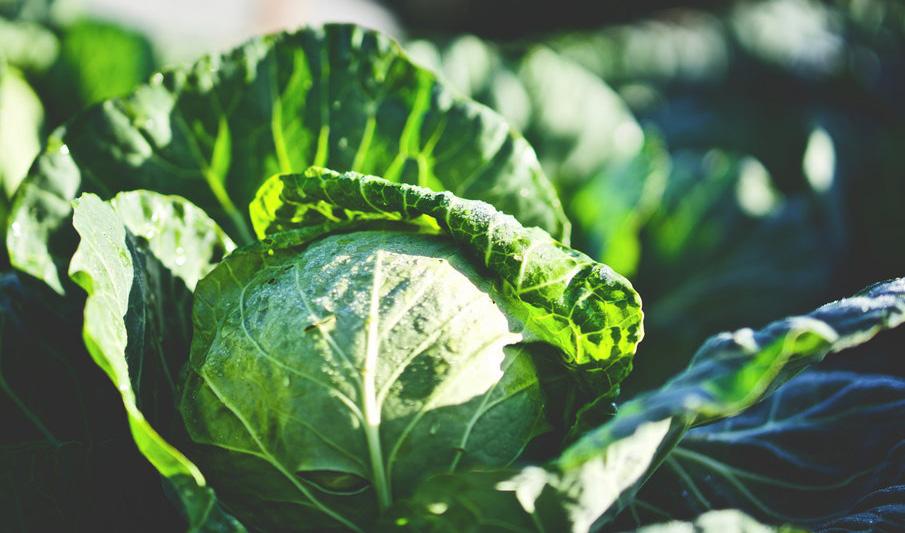
North and the Salad Bowl of the Philippines.
Since the province holds the record and bears the names, the Benguet highland vegetables festival should be anticipated. On April 2018, the 12 organizations and associations of stakeholders within the Benguet Agri-Pinoy Trading Center (BAPTC) planned to initiate the highland vegetables festival. The groups include the Baguio-Benguet- Urdaneta Truckers and Traders Association; Benguet Truck ers and Traders Association; Cacadcadaan Farmers Multi-Purpose Cooperative; Car rot Washers, Disposers, Buyers Associa tion; Cordillera Trading Post Vegetables Traders’ Association; Cordillera Truckers Services Cooperative; Haight’s Farm As sociation; REPOWCA Vegetable Farm ers’ Association; Trading Post BAPTC Transport Group; Sayote Group; Tawid Dagat; and Chicken Dung Dealer Group.
These 12 groups originally planned to have a thanksgiving celebration for their first year anniversary of membership in BAPTC. But what was planned to be sim ple thanksgiving ceremony was turned into a festival. The group thought that it would be a great idea if they were to host
a festival in order to encourage the others to join BAPTC. In addition, a vegetable festival was never celebrated even though the province has been the major producer of such commodities. Through contribu tions and donations from the stakeholders of BAPTC, the first celebration of the Ben guet Highland Festival was pushed through.
The First Celebration of Benguet Highland Vegetable Festival
In June 2018, the first Benguet High land Vegetable Festival was celebrated at the BAPTC. Its theme, “Enriching Highland Vegetable through Camaraderie and Cooper ation among Stakeholders” aims to promote Benguet’s vegetable industry. The invited guests were the Municipal-Local Govern ment Unit, Provincial- Local Government Unit, Department of Agriculture, Benguet State University, the La Trinidad Trading Post and other concerned stakeholders.
The one day activity participated by farmers and other stakeholders high lighted the search for the heaviest and biggest vegetable in the province.
The event became an eye-opener espe cially to the leaders of the municipality and
KAYABANG8
THE OFFICIAL NEWSLETTER OF BENGUET AGRI-PINOY TRADING CENTER
the province. For years, the province of Benguet has played a major role in the veg etable industry of the country. With this, the initiative of conducting the first Ben guet Highland Vegetable Festival opened new opportunities and became an avenue of raising the concerns regarding the vegeta ble industry. The event became a set off for the legislators to craft an ordinance for the highland vegetable festival.
The Crafting of an Ordinance

Celebrating the first highland vegetable festi val caught the interest and support of both the municipal and provincial local government units. With that, an ordinance is currently be ing crafted for the province-wide celebration of the Benguet Highland Vegetable Festival.
The proposed ordinance not only covers the celebration but also gives emphasis to the promotion and development in the veg etable industry of the province. It is stated in the ordinance that the festival will secure the province’s status as a major highland vegetable producer in the region. Further more, it is an agri-tourism event which can help boost the income of farmers and oth er stakeholders in the vegetable industry.
A public consultation on the ordinance was held on March 27, 2019 wherein stake holders concerning the vegetable industry and legislators discussed and improvised the proposed ordinance. Another public hearing will be conducted on April 4, 2019 for its finalization. Though the ordinance is on-going, the celebration of second high land vegetable festival is to be anticipated.
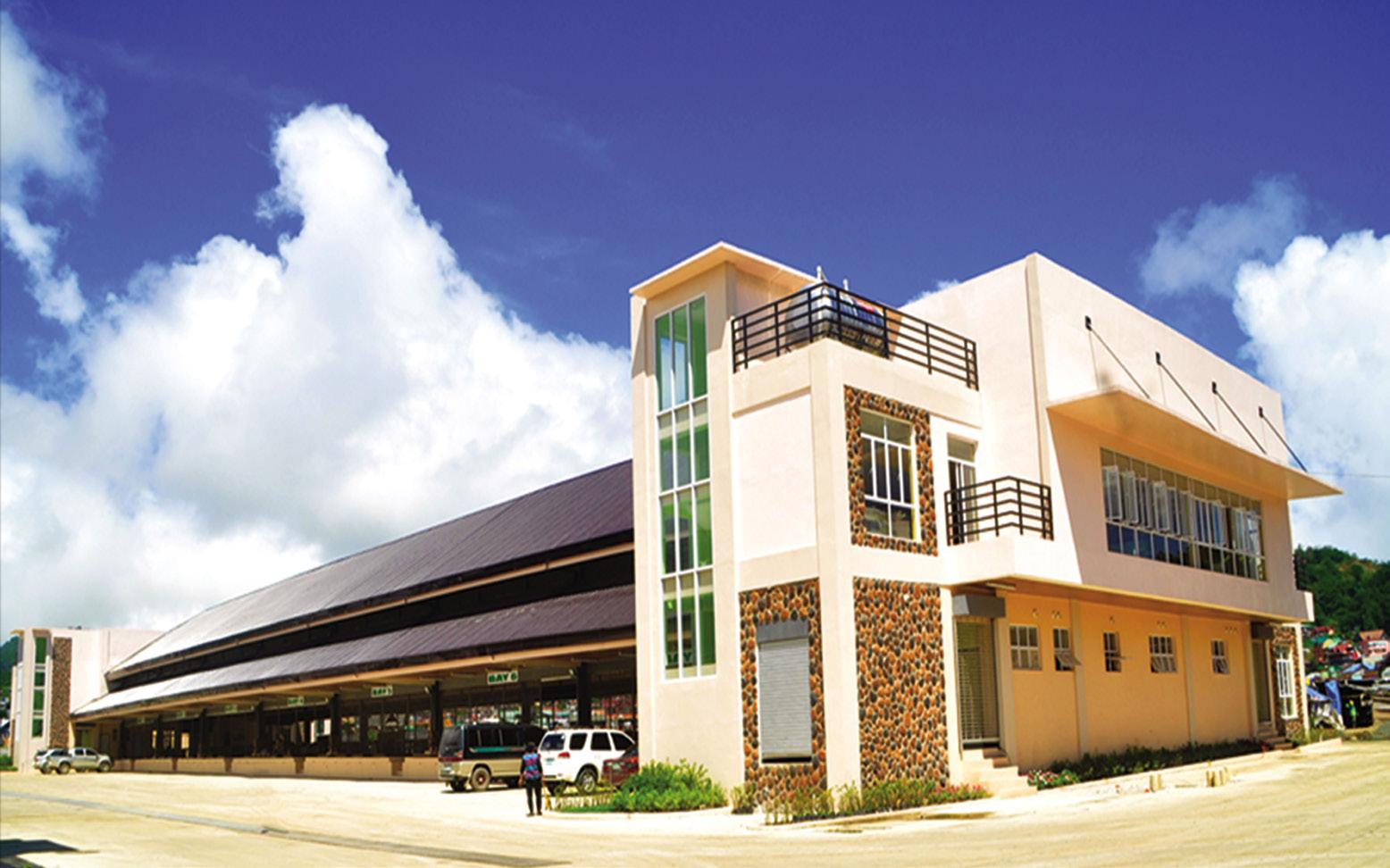
A Celebration to be Anticipated

The Highland Vegetable Festival Stake holders’ Association, an organization formed by the 12 initiating groups, together with Hon. Namoro continues the planning of the second Highland Vegetable Festival. The celebration is scheduled on the last week of April which will be held at the Benguet AgriPinoy Trading Center, Strawberry Fields. Various activities were prepared by the committee in which the much awaited heaviest and biggest vegetable will be fea tured. Contests such as vegetable packing and vegetable fun run will also be done.
It is high-time that the prov ince of Benguet celebrates the indus try that gives life to the community. Celebrating is thanksgiving. A thanksgiving for the year round of bountiful harvest and continuous growth of the vegetable industry.
//GLYREL B. PALBERAS_BSU-DDC -INTERN
FACT ABOUT
KAYABANGTHE OFFICIAL NEWSLETTER OF BENGUET AGRI-PINOY TRADING CENTER
9
BAPTC
The Benguet Agri-Pinoy Trading Center (BAPTC) is considered to be the biggest and most modern vegetable trading facility in the country.
The Making of Farm-Preneurs
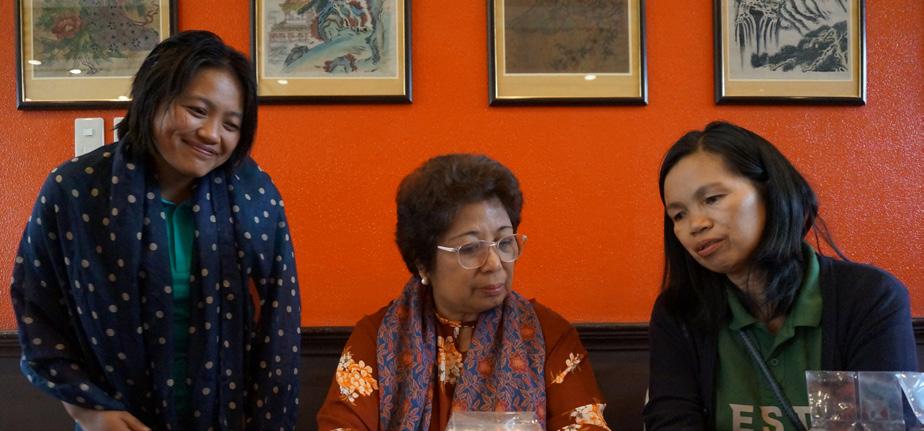
Most of local farmers of Benguet de pend on the middlemen to do the market ing function for them. The intervention of the middlemen has played a big role in the trading system of the products of the locale. Also, making the trading system lengthy in process and costly in production.
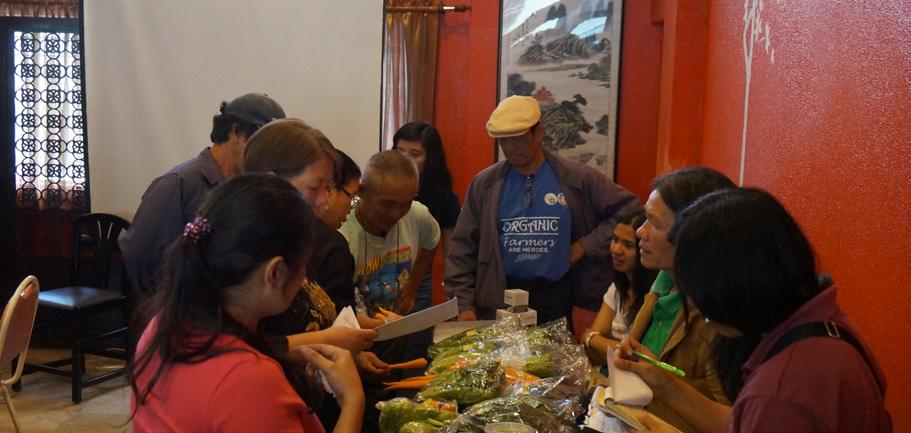
Initially, the Japan Agricultural Ex change Council (JAEC) is implementing the Safe Vegetable and Product Manage ment Technology Project, in partnership with the Department of Agriculture – Cor dillera Administrative Region Field Office (DA-CARFO); Provincial Local Govern ment of Benguet (PLGU-Benguet) ; Local Government (LGU) of Buguias, Kibungan and La Trinindad; Benguet State Universi ty (BSU) and Benguet Agri-Pinoy Trading Center (BAPTC). Within this project is a study on capacitating small scale farmer’s association through barangay or munici pal food terminals (BFTs/ MFTs) and agripinoy trading centers profiling and plan ning workshop. Through series of trainings and seminars, the farmers are prepared and educated to become farm-preneurs.
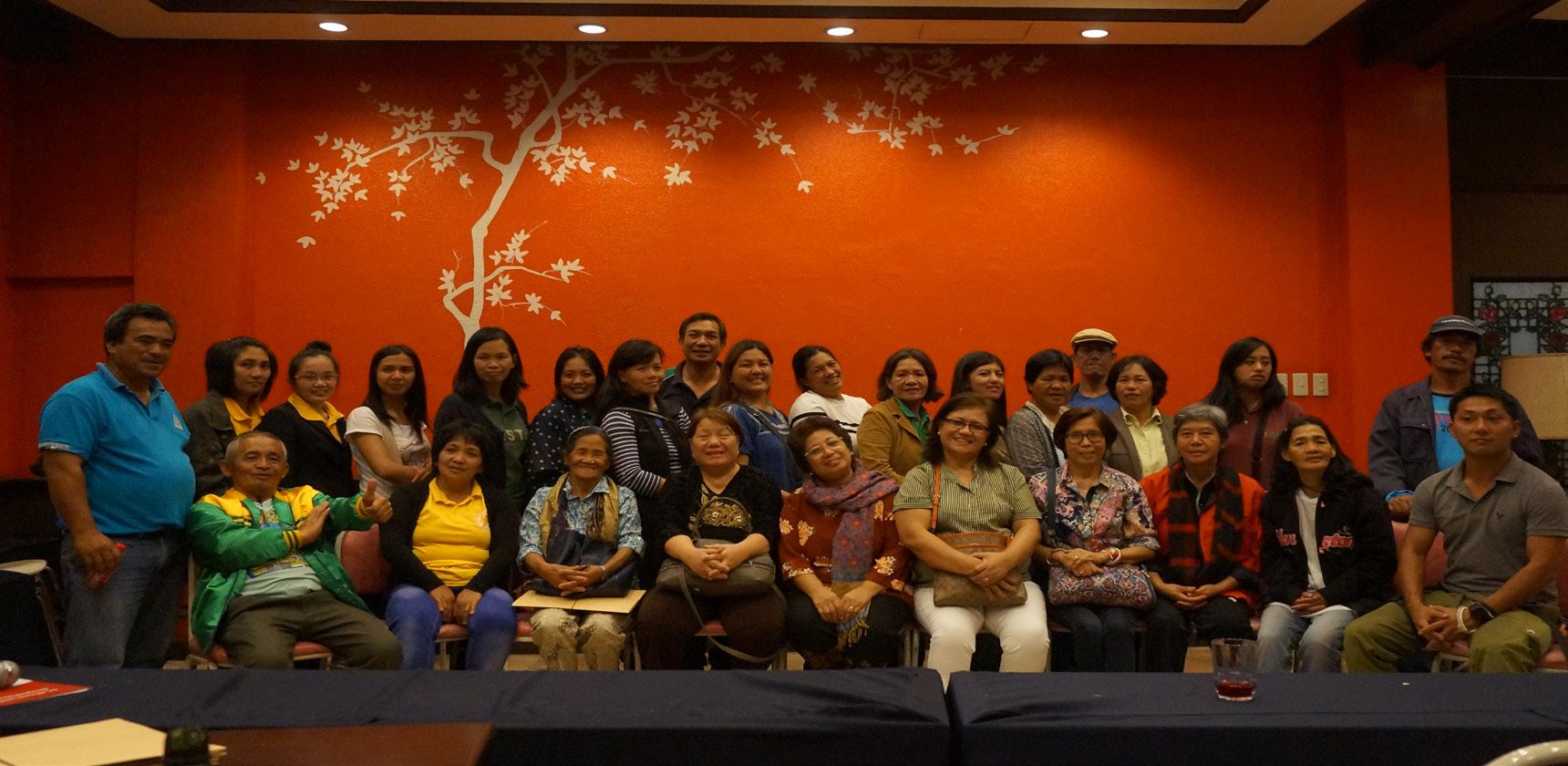
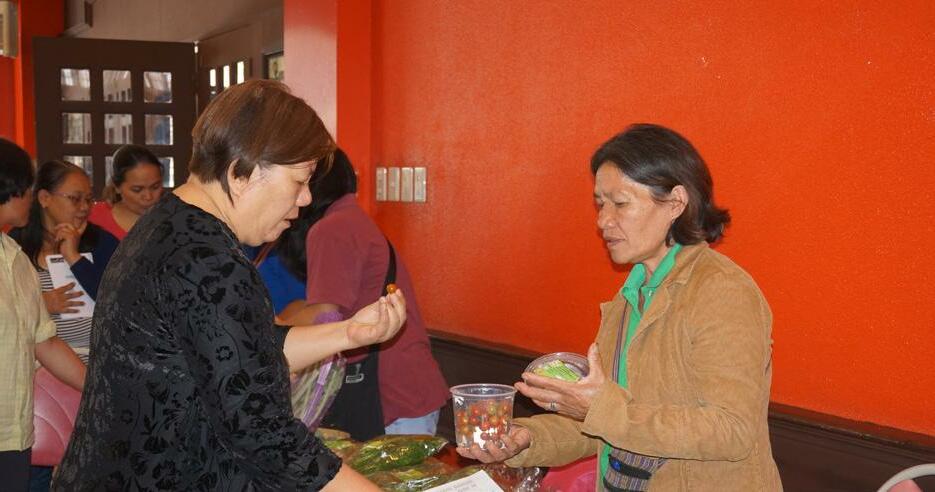
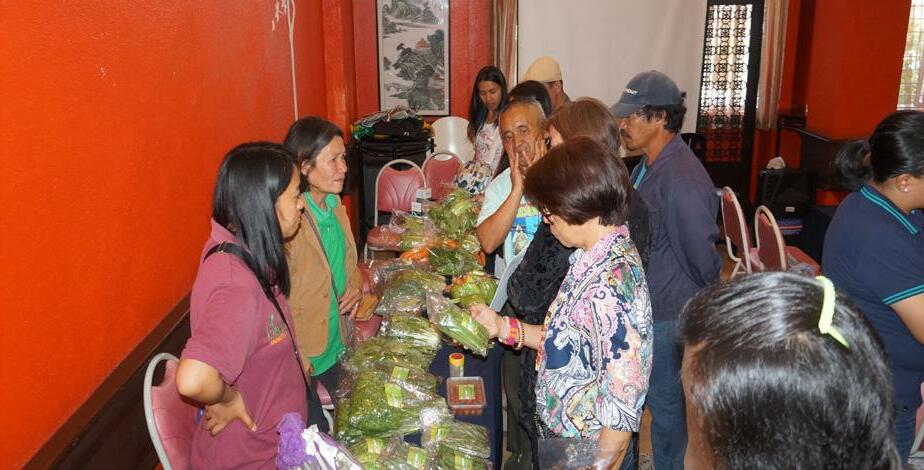
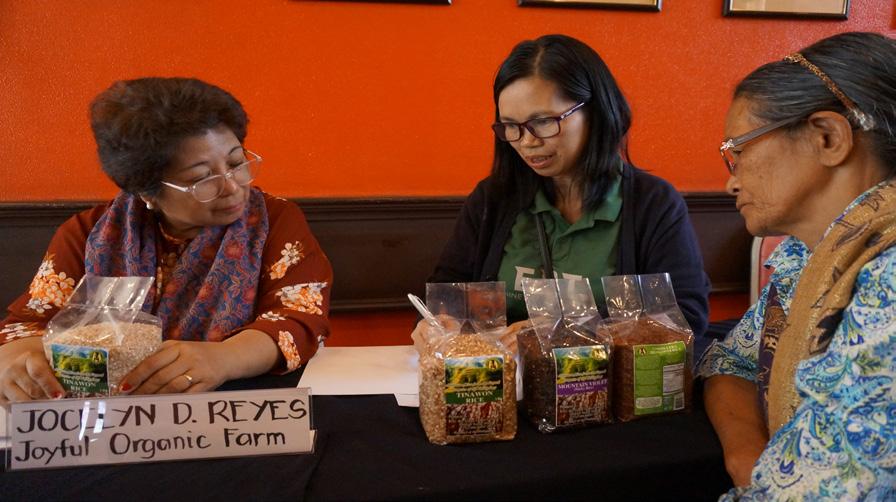
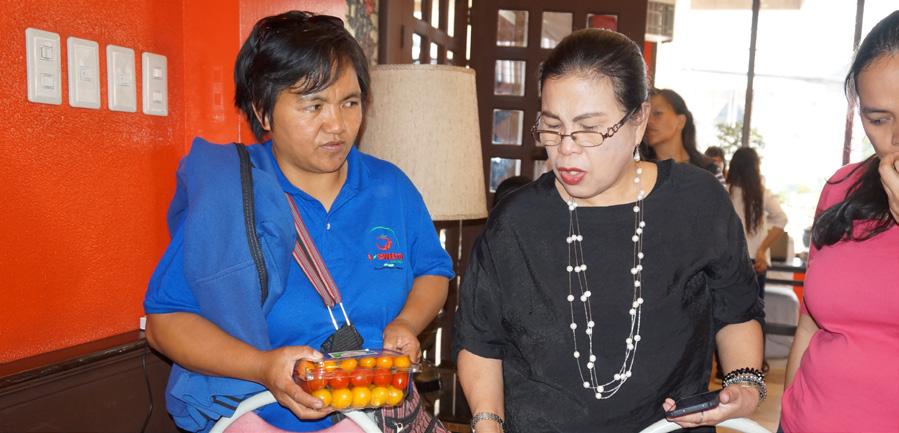
Farm- preneurs refers to farmer-en trepreneurs wherein the farmers will not only be producing the crops but they will also be marketing it. The project aims to establish an effective production-market ing system for the farmers, thus, linking the farmers directly to the institutional buyers. The farmers or the farmer’s asso ciation directly supply their produce to the end consumers lessening the market layer
and target consumer is already identified. An advantage of this is implementing the farmer’s market concept wherein buyers can directly interact with the producers.

On the other hand, the institutional buyers can set their standards with the farmers once they have a deal through market linkages and are able to ac cess these products in a lower price
The project is to empower and challenge farmers’ associations to supply quality pro duce. With that, standards and quality con trol is done to reach certain qualifications set by the buyer. Through market linkages, both the farmers and buyers come to an agreement. The price for the farmer’s pro duce can be set, thus, the farmer already know the amount of money that he or she is going to gain. The products that are be ing supplied by the farmers are secured knowing that there are buyers waiting for the products. Unlike in the trading system that we are used to wherein the farmers have to gamble when it comes to their products’ price. With the involvement of middlemen, the prices of goods varies.
The study on capacity building is an em powerment program wherein farmers’ as sociations learn the marketing function in the trading system. In that way, they can be able to do direct negotiations and market their products. In that way, farmers are not merely farmers but they are also entrepre neurs. Thus making them farm-preneurs.
// GLYREL B. PALBERAS_BSU-DDC_INTERN
KAYABANG10 THE OFFICIAL NEWSLETTER OF BENGUET AGRI-PINOY TRADING CENTER








































